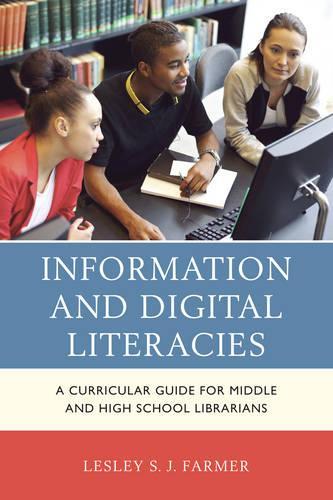
Information and Digital Literacies: A Curricular Guide for Middle and High School Librarians
(Hardback)
Available Formats
Publishing Details
Information and Digital Literacies: A Curricular Guide for Middle and High School Librarians
By (Author) Lesley S.J. Farmer
Bloomsbury Publishing PLC
Rowman & Littlefield Publishers
8th October 2015
United States
Classifications
Professional and Scholarly
Non Fiction
027.8
Winner of SLC/ARBA Best in Reference Award: Best Professional Resource for School or Youth Librarians 2017
Physical Properties
Hardback
156
Width 158mm, Height 239mm, Spine 17mm
381g
Description
Information and Digital Literacies: A Curricular Guide for Middle and High School Librarians is a practical guide to help school librarians design and deliver effective instruction that addresses the knowledge, skills and dispositions of information and digital literacies. This curricular guide from one of Americas foremost experts in this area will help librarians prepare students for college and careers. It provides systematic instruction about conducting research and using integration as stated in the Common Core, complying with state and federal mandates for digital safety/competence curriculum, and recognizing the instructional role of school librarians. It should be noted that canned programs, particularly for digital safety exist, but they are not aligned with other school standards, and they do not reflect the unique communities of learners, let alone address the need to collaboration and articulation. The ready-to-implement curricular guide features: instructional design strategies, model middle and high school curriculum, including a scope-and-sequence, stand-alone courses, units of instruction, and sample learning activities, and ties to new AASL and ACRL information literacy standards, ISTE technology standards, 21st Century Partnership framework, and Common Core State Standards.
Reviews
Farmer, a noted expert on information literacy (and longtime Booklist reviewer), is passionate about her subject, believing that there needs to be a systematic way for all students to become information literate, despite the lack of any standardized curriculum to assist in this endeavor. Her latest book is aimed at teacher-librarians in middle- and high-school settings. The text begins with a historical overview of literacy, education, and school librarianship, moving into detailed descriptions of informational literacy and digital literacy. The book then delves into ready-to-implement model plans and frameworks for both age ranges. Farmer shows a firm understanding of a variety of standards, including AASL and ACRL information literacy standards, ISTE technology standards, and Common Core State Standards. The book concludes with an extensive bibliography and index. This is a valuable addition to any library environment where information literacy or other library skills are taught. * Booklist *
This is a great how-to manual on integrating new literacy instruction. Chapters start with a clear introduction and close with useful paragraphs on 'Implications for School Librarians' and 'References' where applicable. While early chapters are useful and provide clarity and definition, chapters focusing on middle school and high school curriculum is where the meat of this guide lays. Curriculum development for digital and information literacies is offered in the form of stand-alone courses, instructional units, and learning activities. Suggested grade levels for lessons are clear and the week-by-week structure provided for lengthier units increases the likelihood of use by librarians who wish to easily replicate or modify curriculum. Variations in lessons and planning for diverse learners make these curriculum plans open to adaptation. Tables and figures are well placed and correlate with informational text. This book will be well used and loved by school librarians developing and teaching curriculum for middle and high school students. Teachers will also find this very pertinent for strategy and skill development in teaching research to prepare students for college, life, and work in the real world. * School Library Connection *
This text is a great manual on the how-to of integrating new literacy instruction as many schools change to standards such as the Common Core State Standards (CCSS), American Association of School Librarians (AASL) standards, and others. The introductory chapters are useful and provide clarity and definition, but the chapters on middle school and high school curriculum are the heart of this book.... Information And Digital Literacies is unequivocally a guide that will be well used and loved by school librarians developing and teaching curriculum for the middle school and high school student. Teachers will also find this very pertinent for strategy and skill development in teaching research to prepare students for college, life, and work in the real world. Highly recommended. * American Reference Books Annual *
Author Bio
Dr. Lesley Farmer, Professor at California State University Long Beach, coordinates the Librarianship program. She earned her M.S. in Library Science at the University of North Carolina Chapel Hill, and received her doctorate in Adult Education from Temple University. Dr. Farmer has worked as a teacher librarian in K-12 school settings as well as in public, special and academic libraries. She is past chair of the Education Section of the Special Libraries Association, edits two IFLA section blogs, and is a Fulbright scholar. In 2011 she was selected for the ALA Beta Phi Mu Award for contributions to library education, and was recently awarded the LIRT Librarian Recognition Award. A frequent presenter and writer for the profession, Dr. Farmers research interests include information literacy, collaboration, assessment, and educational technology.
